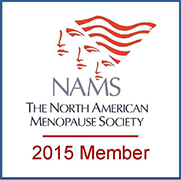Frequently Asked Questions
By definition, menopause has occurred when your menstrual period has stopped for 12 months (no more periods!), which means your ovaries are no longer functioning. When women say they are “menopausal”, most often they are experiencing symptoms of the transition to menopause, called the perimenopause,
Perimenopause:
• Is the period of a woman’s life when physical and psychological changes indicate the approach of menopause, the end of women’s reproductive capacity;
• These signs may begin 10 or more years before menopause. The average age of natural menopause is 51 years, so symptoms of perimenopause may start as early as 41 years of age;
• Fluctuations in estrogen levels cause symptoms such as hotflashes, breast tenderness, and decreased vaginal lubrication;
• Menopause caused by surgery or chemotherapy may cause a sudden drop in estrogen resulting in sudden often intense symptoms.
Premature (early) menopause occurs naturally or is induced before the age of 40.
Induced menopause occurs when periods are stopped by an intervention such as chemotherapy, radiation or surgical removal of the ovaries.
Premature ovarian failure occurs when periods stop for several months or years, long before the typical age of menopause. Temporary premature ovarian failure may be caused by drastic weight loss, an eating disorder, excessive exercise or stress. Permanent premature ovarian failure may be related to genetic abnormalities or certain autoimmune diseases.
Improving Women's Lives Through Better Health in Mid-Life and Beyond


